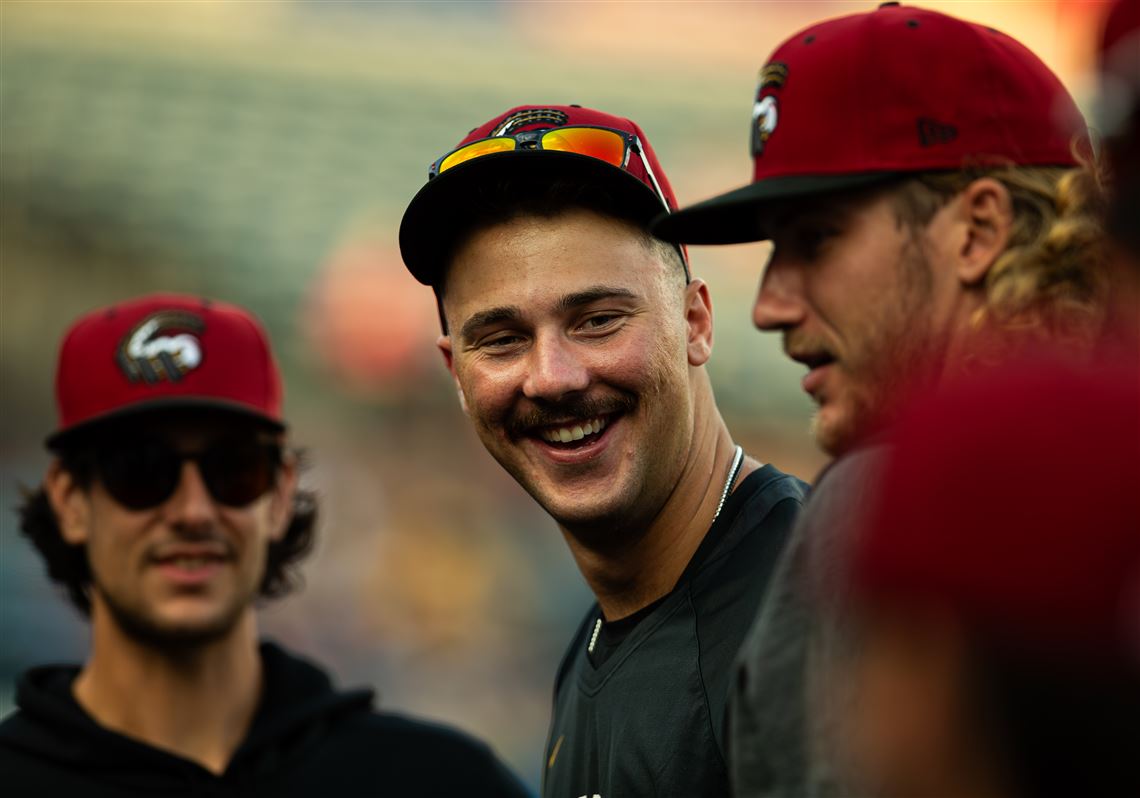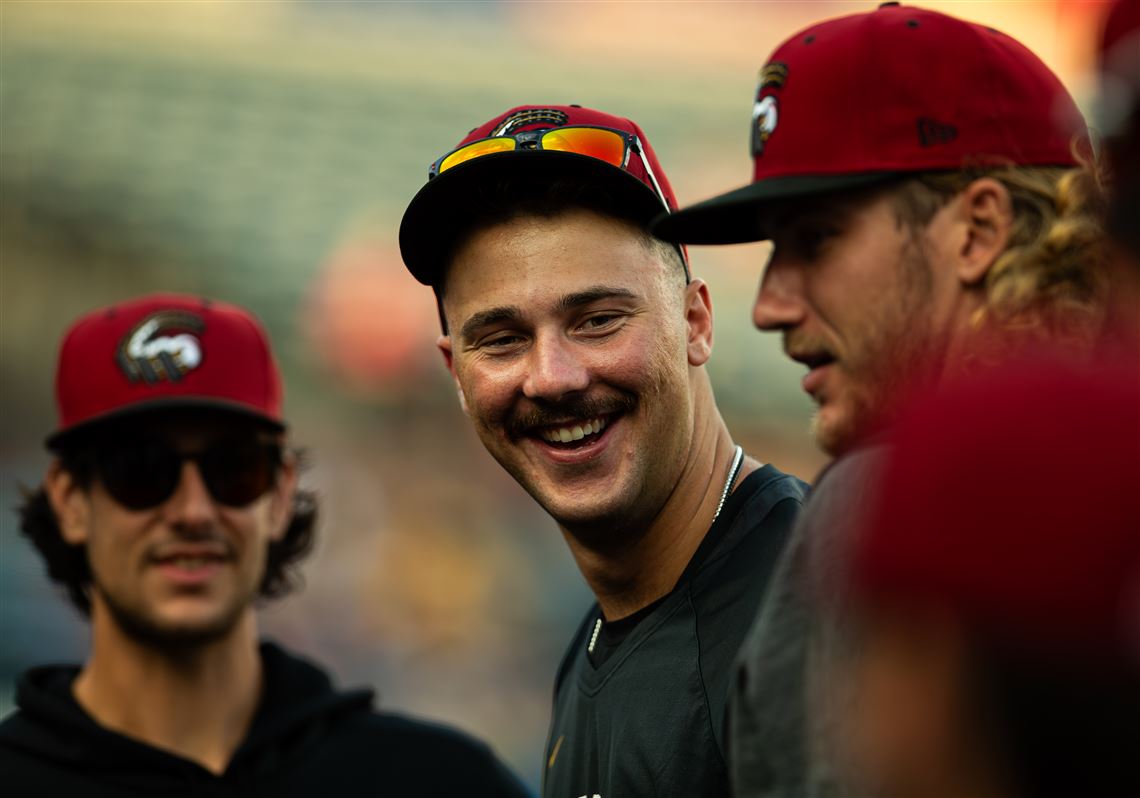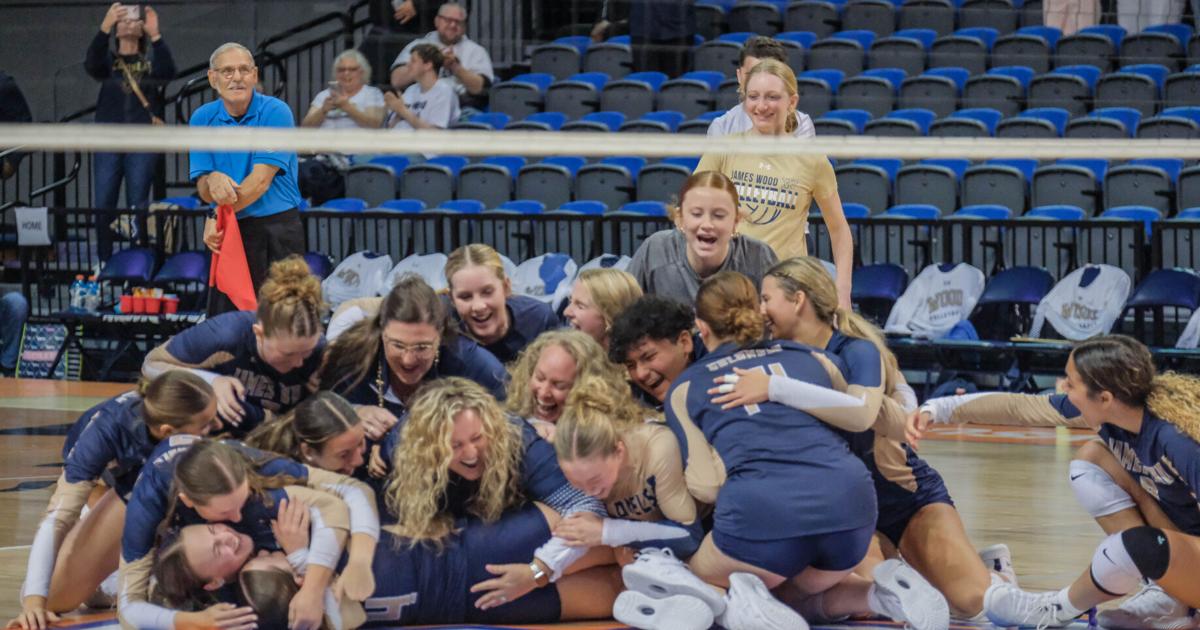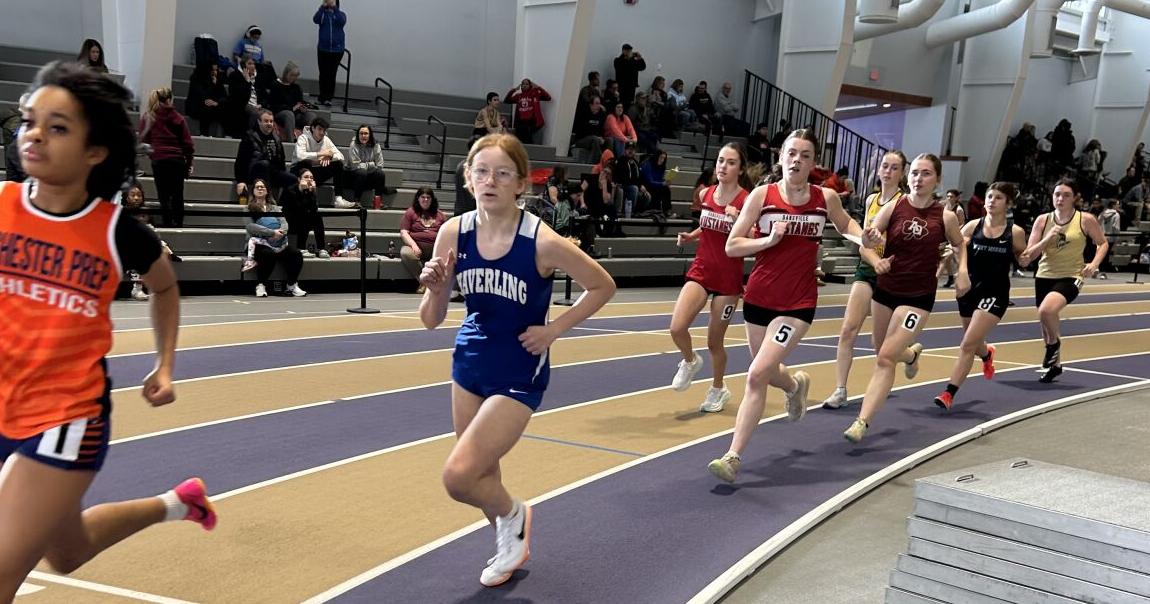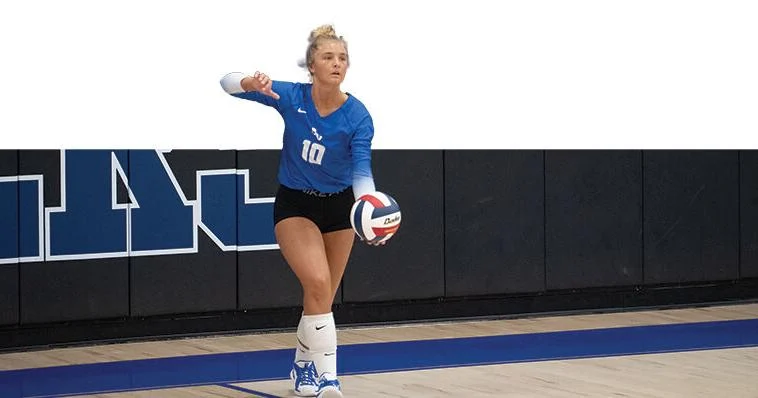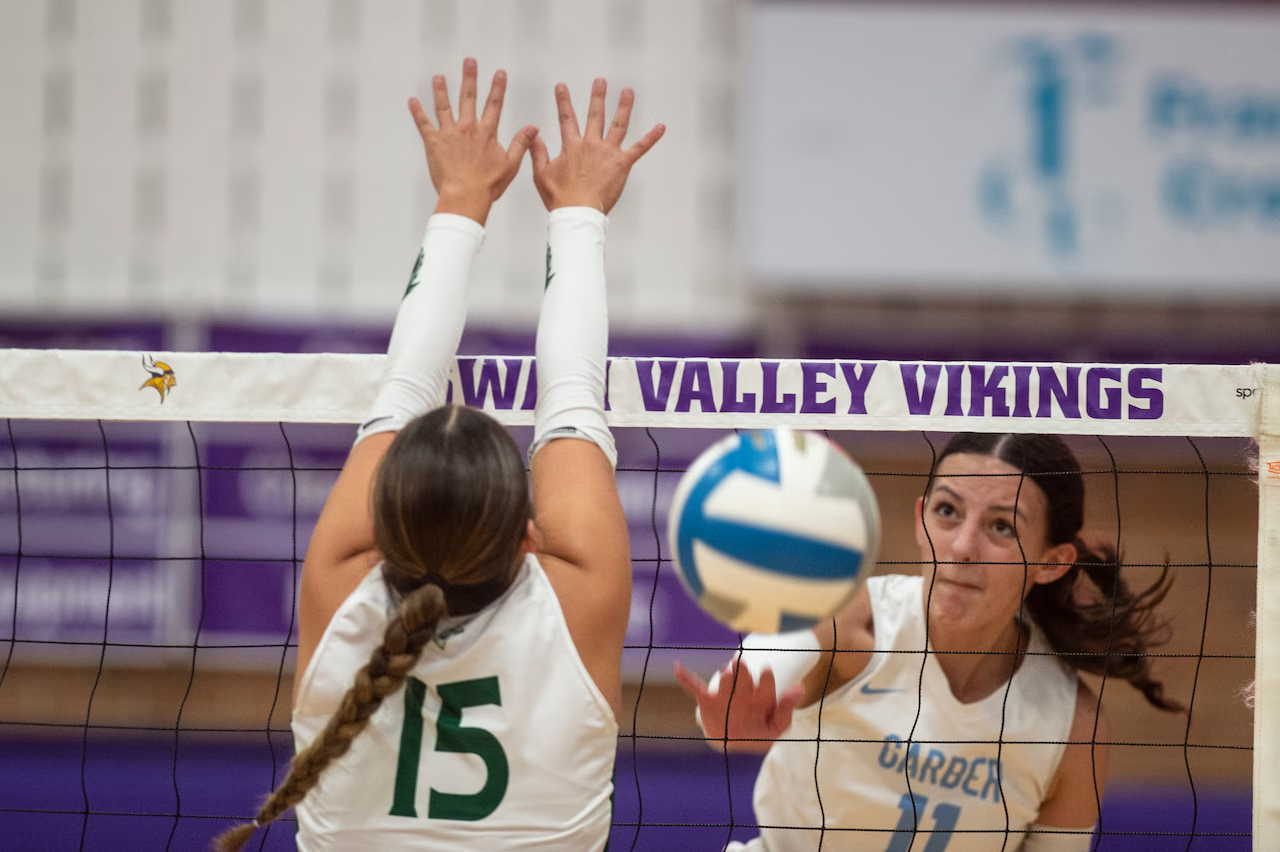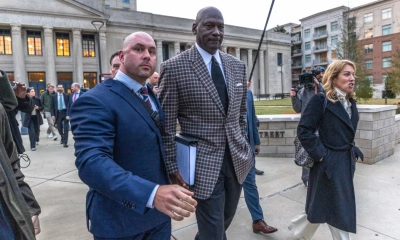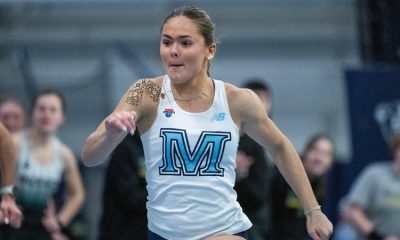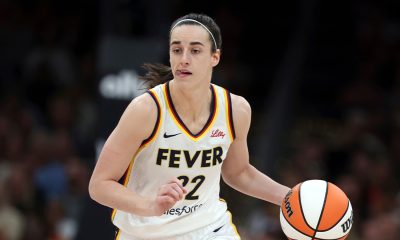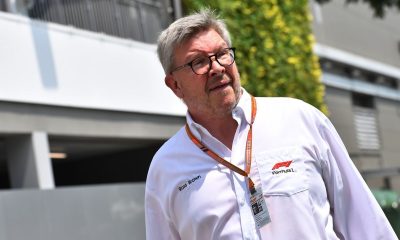James Wood High School volleyball made history this year, becoming the first Frederick County team across any sport to win four straight state championships. The Colonels’ achievement is The Winchester Star’s No. 1 sports story of 2025.
James Wood defeated Loudoun County 3-1 on Nov. 22 at Virginia State University to complete a dominant run that saw the Colonels compile a 108-8 record over the four-year span. The victory also allowed three pillars of the team to leave on a high note, as sixth-year head coach Adrienne Patrick and four-year varsity outside hitters Kennedy Spaid and Brenna Corbin all won their fourth straight title in their final seasons at James Wood. Patrick is now an assistant principal at Millbrook.
In 2025, the Colonels posted their best record in program history, going 30-2 after competing in two early-season tournaments that propelled them to this milestone. On Aug. 30, they hosted the Champions Classic and went 5-0, defeating Handley and their eventual championship opponent, Loudoun County, along the way.
On Sept. 13, they went 5-0 at the Endless Summer High School Volleyball Tournament — an event that features some of the best teams in and around the state of Virginia. Additionally, the Colonels went a perfect 9-0 against Frederick County teams in the regular season and postseason.
Come playoff time, James Wood defeated Sherando 3-0 in the Region 4D quarterfinals and Millbrook 3-1 in the semifinals before sweeping E.C. Glass to win the Region 4D championship.
In the Class 4 state tournament, the Colonels defeated Dominion 3-0 in the quarterfinals and Courtland 3-1 in the semifinals, punching their ticket to Petersburg, where they bested the Captains to claim their championship.
The team also garnered plenty of individual recognition, as Spaid and Corbin were each named to the Class 4 All-State, All-Region 4D and All-Northwestern District First Team. Additionally, senior middle hitter Claire Keefer and junior outside hitter Kyla Wilhelm were named to the All-Northwestern District First Team and the All-Region 4D Second Team, while freshman defensive specialist Macie Hewitt was named to the All-Region 4D Second Team.
Patrick received major credit as well, winning the Class 4 Coach of the Year and Region 4D Coach of the Year.
The Colonels will potentially return eight of their 11 players from this year’s team next fall. Spaid, Corbin and Keefer will continue their careers at the NCAA level, as Spaid will play beach volleyball at Arizona State University, Corbin will play indoor volleyball at James Madison University and Keefer will play indoor at King’s College.
2. Handley boys, Clarke girls make state semifinal basketball runs
The Handley boys and Clarke County girls each made exhilarating runs to the Virginia High School League state semifinals in their respective classifications.
The Judges went 25-2 for their most wins since 2018. They began with 21 straight wins, with a margin of victory of at least 10 points in every contest. Handley’s only regular-season loss came in the finale to West Virginia Class AAAA state champion Spring Mills by a 64-60 overtime score.
In the postseason, Handley defeated Sherando 69-45 in the Region 4D quarterfinals (the Judges outscored the Warriors by 70 points in their three wins against them) and beat Millbrook 76-49 in the semifinals to earn its first state berth since 2023. Handley set a program record for point differential in its series with the Pioneers, outscoring them by 60 in three games.
Handley followed that with a 56-52 win over E.C. Glass in the Region 4D final (the Judges outscored the Hilltoppers 9-0 in the last two minutes) and a 68-37 win over Heritage (Leesburg) in the Class 4 quarterfinals.
In the Class 4 semifinals, the Judges had a 36-28 lead with 1:40 left in the third quarter following a 10-0 run. But Varina outscored Handley 28-16 over the remainder of the game to earn a berth in the state final.
Sophomore Will Braun-Duin was named First Team All-State and the Region 4D and Northwestern District Player of the Year. Junior Christian Dinges was named Second Team All-State.
Clarke County started 9-4, then ripped off 15 wins in a row, with each victory coming by 15 points or more. During that winning streak, Clarke County avenged a 37-29 loss to Strasburg (67-40), won the Bull Run tournament title over Central (70-46), the Region 2B final over Stuarts Draft (61-36) and blew away Prince Edward County 81-52 in the Class 2 state quarterfinals. Prince Edward had started the season with a 26-game winning streak.
In the Class 2 semifinals against John Marshall at Huguenot High School in Richmond, Clarke County suffered severe foul trouble, and the Justices took advantage for a 67-54 win.
Clarke County was whistled for 31 fouls. John Marshall made 19 of its 36 attempts from the line while Clarke County made only 6 of 15 (the Justices committed 15 total fouls). John Marshall made 7 of 13 shots from the line in the fourth quarter, a period in which four Eagles fouled out and the Justices led by at least eight points throughout.
In addition to earning VHSL Class 2 First Team All-State honors for the third time, Alainah McKavish was also named the Bull Run District and Region 2B Player of the Year. McKavish’s freshman sister Paige earned Second Team All-State honors.
After the season, head coach Regina Downing — who guided the Eagles to the 2023 Class 2 state title — left the team after 13 years and is now the head coach at Sherando. Former assistant Shadd McCaw has led the Eagles to a 7-1 record to start the 2025-26 season.
3. Girls’ state title highlights Clarke County track & field season
Andre Kidrick didn’t know 2025 would be his final year as Clarke County’s head track & field coach, but he couldn’t have asked for a much better one to conclude his 18 years at the helm.
Both the boys’ and girls’ teams repeated as Bull Run District meet champions (the boys won by 62 points, the girls won by 48) and both programs won their first region titles since 2009. The girls won the Region 2B title by 17 points and the boys won by two points, with Kidrick earning Region 2B Coach of the Year honors.
At the Class 2 state meet at James Madison University in Harrisonburg, the Clarke girls captured their first state title since 2009 with 64 points to Lee’s 56.5. Clarke County senior Teya Starley won a state title in the 800, and the 4×400 team of senior Reagan Myer, freshman Kendall Harman, sophomore Grace Gerenski and Starley also captured a state championship.
In the boys’ Class 2 meet, Clarke County placed fifth. Senior Jackson Ellis highlighted Clarke County’s performance by winning the 800.
During the regular season, both teams won Page County’s Page Valley Invitational, the girls won Stonewall Jackson’s Generals Invitational and the boys won Harrisonburg’s JJ Updike Last Chance Invitational.
After the season, Kidrick revealed he was taking the position of Clarke County Public Schools’ director of operations. He led the Eagles to five state championships (three girls, two boys). Former assistant Gary Wymer is now the head coach.
4. Sherando wrestler Lucchiani highlights individual state championships
With a combined 47 state championships through 2024, wrestlers from Winchester and Frederick County had left their mark on the VHSL over the years. In 2025, one of them entered uncharted territory.
Sherando senior Anthony Lucchiani became the first wrestler in the combined history of Sherando, Handley, James Wood and Millbrook to win four state titles when he defeated Woodgrove’s Camden Murray 10-1 in the Class 4 138-pound title match at Tallwood High School in Virginia Beach. The win capped a 42-2 season and a 187-14 career. Lucchiani is now at NCAA Division I George Mason.
James Wood sophomore Hayden Black also won a state wrestling championship, going 50-1 en route to the Class 4 title at 106 pounds. He helped James Wood place sixth in Class 4 after winning their first regional title in 2007.
The winter also saw James Wood senior Joe Warnagiris and Sherando senior Toby Winston make history at the Class 4 swim meet. Warnagiris repeated as state champion in the 200-yard individual medley (1:49.61) and the 100 breaststroke, breaking the state meet record in the breast with a time of 55.48 seconds. He is taking a gap year before going to NCAA Division I Missouri. Winston won the 100 free (45.56) for Sherando’s first-ever state swimming title.
In indoor track & field, Handley senior Jaishaun Offutt (now playing football for Wake Forest) defended his state shot put title (56-6), Sherando senior Noah Harris (6-8) captured the high jump and Handley junior Rylan Stribling won the 55 (6.40) in the boys’ meet. In the girls’ meet, Handley senior Emeryce Worrell defended her state titles in the 55 (7.02) and 300 (39.22).
In outdoor track & field, Clarke County wasn’t the only school to take home championship hardware. Stribling added to his state title collection by winning the 100 (10.75) and 200 (21.21) state titles. James Wood junior Kate Konyar won her first state title by winning the Class 4 3,200 (11:02.34) and Millbrook sophomore Janai Washington won the high jump (5-4) for her first state title.
5. State soccer success for Clarke, Handley
Both Clarke County soccer teams made their fifth straight state tournament appearances in 2025, while the Handley girls made their first-ever appearance in a state tournament game in 2025.
Despite losing 13 seniors and eight starters from its 2024 state runner-up team, the Clarke County girls found themselves back in the state final. They opened 0-5 after being outscored 22-2 by James Wood, Sherando and Handley, but won 16 of their last 18 games to finish 16-7. Clarke County won its fifth straight Bull Run District regular-season championship and its third straight Region 2B title. In the Class 2 tournament, Clarke County beat King William 9-0 in the quarters and Graham 4-0 in the semifinals before falling 2-1 to Poquoson in the final.
The Clarke County boys fell in the state semifinals for the second straight year, losing to Glenvar 3-1. The Eagles went 15-7 overall and won their fifth straight Bull Run District title. The 2025 season marked the last of nine seasons as head coach for Patrick Casey, who guided the Eagles to the 2022 state championship.
Senior defender Morgan Walker and senior forward Leah Mitchell (First Team) and Makenna Jarvis (Second Team) earned All-State honors for the Clarke girls and junior midfielder Johnny Mercer, junior forward Burns Beckett and senior defender Emmet Morris (First Team) and senior midfielder Brody Murphy and senior defender Jose Ramirez (Second Team) were named All-State for the Clarke County boys.
Led by All-State senior forward Emeryce Worrell and All-State junior midfielder Mia Hudson, the Handley girls went 14-4-2 and won their first region title in program history. Worrell scored all of the Judges’ goals in a 3-2 win over Blacksburg in the Region 4D final. Worrell scored 42 goals, the most for a Winchester-Frederick County girl since The Star began its Girls’ Soccer Player of the Year award in 1997.
The Judges would have moved on to the state quarterfinals regardless of the result, but Worrell elected to play in the game rather than run in the state track & field preliminaries in Lynchburg. Worrell was the defending 100 state champion and the top seed for the 200. Handley’s season came to an end with a 4-2 loss to Woodgrove in the Class 4 state quarters.
6. Handley leads high school football season
The 2025 high school football season saw noteworthy achievements and an end to a stellar streak.
Handley went 10-2 for its most wins since 2009 and captured the Barr-Lindon Crimson Apple, awarded by The Winchester Star to the team that fares best in Winchester-Frederick County football games. The Judges’ season ended in the Region 4D semifinals with a 14-10 loss to Jefferson Forest.
Sherando went 8-4 and lost 41-21 to George Washington in the Region 4D semifinals. The Warriors’ 20 combined wins in 2024-25 are their most over two seasons since they won 21 in 2017-2018.
James Wood went 7-4 and lost 56-35 to Sherando in the Region 4D quarterfinals. The years of 2024-25 marked the first since 2010-11 that the Colonels made the playoffs in back-to-back seasons, and their 14 wins over two years are their most since winning 15 in 2008-2009.
Millbrook went 3-7 under first-year head coach Nick Manuel. The Pioneers were hurt by injuries late in the season, but they were the only team to beat Northwestern District champion Kettle Run during the regular season. The Cougars went on to play in the Class 3 state championship game.
After having a winning season and making the playoffs in every full football season since 2007, Clarke County went 1-9. This year marked the Eagles’ fewest number of wins since 2000.
7. Clarke teams headline cross country season
Both the Clarke County boys’ and girls’ teams had some adjustments to make in 2025 — the Eagles lost their top three runners from their state championship boys’ team, and the girls lost five of the seven runners who helped Clarke finish second in Class 2, including their top two.
Both Clarke County teams ended the year by once again taking home hardware from the Class 2 meet. Over the last five years, no VHSL cross country program has more state trophies for taking first or second place than Clarke County (nine, five on the girls’ side).
This year, the Clarke County girls placed second in Class 2 for the fourth straight season. Four runners earned state medals — freshmen Lyla Gerenski (11th), Morley Hudson (13th) and Margaret Myer (14th) and junior Ashley Moran (15th). The Eagles also won their fifth straight Region 2B title and their sixth straight Bull Run District championship.
The Clarke County boys placed second in the Bull Run District, Region 2B and Class 2 state meets. Junior Landon Horton placed third to earn All-State honors.
In Class 4, James Wood senior Kate Konyar capped one of the greatest cross country careers in area history. She set what appears to be the Frederick County record by running a 3.1-mile time of 17:44.7 at the Virginia Showcase. In taking third at the Class 4 state meet, Konyar became the first Winchester-Frederick County runner in 27 years to have four top-five state finishes. Konyar will run for Maryland next year.
8. Clarke County volleyball returns to state semifinals
2025 treated Clarke County volleyball well. The Eagles totaled a 19-7 record, including a 13-1 showing in the Bull Run District, en route to returning to the Class 2 state semifinals for the second year in a row.
Although the team fell to Fort Defiance in both the Region 2B championship and in the Class 2 semifinals, it still had plenty to be proud of once its season concluded. After a 1-3 start, Clarke County lost just two non-postseason matches the rest of the way and was only taken to five sets a single time all season.
The team was led by junior outside hitter Isabel Aliveto and senior middle hitter Bryn Franzen, who were each named to the Region 2B and Bull Run District First Team. Aliveto was also named the Bull Run District Player of the Year and made the Class 2 All-State First Team, while Franzen made the All-State Second Team.
Additionally, the Eagles found success no matter who was coaching. They went 8-3 under head coach Skyler Layton to start the season, before going 11-4 under assistant coach Darren “Fly” Lambert after Layton went on maternity leave.
9. Shenandoah football equals last year’s win total, makes it back to another bowl game
For the third time in four seasons, Shenandoah football picked up eight victories, finishing 8-3 this past fall while qualifying for the Chesapeake Challenge Bowl Series for the second straight year.
During head coach Scott Yoder’s 13th season at the helm, the Hornets went 6-2 in the ODAC and punched their ticket to a bowl game during the final regular-season game against Washington and Lee. Shenandoah won 17-14 after kicker Carson Gallant made a 31-yard field goal with 1:44 left, while the Generals’ kicker missed a 25-yarder with 21 seconds remaining.
Though the Hornets went on to lose the Cape Henry Bowl to Wilkes University 37-35, there were still plenty of other reasons to celebrate after the season came to a close.
Senior linebacker Matt Conroy ended his career as the program’s all-time leading tackler with 442, breaking the previous record of 352 against Bridgewater on Oct. 4. Conroy’s 147 tackles this past season led all of Division III. Conroy earned All-America recognition from the Associated Press (Third Team) and Walter Camp.
Conroy was one of nine Hornets to be named to one of the All-ODAC teams, being joined on the First Team by senior offensive lineman Andy Anderson and graduate student cornerback Sean Perry.
The biggest difference maker for Shenandoah was arguably freshman quarterback Mekhi Brown, an at-large All-ODAC Third Team selection. Taking over as the starter in Week 4 against Bridgewater, Brown completed 138 of 194 passes for 1,612 yards, 18 passing touchdowns and six interceptions. The team went 6-2 in games he played, helping Brown win ODAC Rookie of the Year honors.
Overall, the Hornets outscored opponents 29.9 to 20.3, averaged 221.1 passing yards and 151 rushing yards per game, recorded 21 sacks and hauled in 12 interceptions.
10. Sherando girls’ tennis makes state semis
After a 17-win season that ended in the state quarterfinals in 2024, Sherando was even more impressive in 2025.
The Warriors went undefeated in the regular season, shutting out 11 of their 16 opponents.
In the postseason, Sherando opened with a 5-1 win over Orange County in the region quarterfinals. Sherando followed that with a 5-2 win over Handley for its third straight state tournament berth. The Warriors then beat Blacksburg 5-3 for their first region title since 2017.
In the Class 4 state tournament, Sherando beat Region 4C runner-up Loudoun Valley 5-3 in the quarterfinals for its first state win since advancing to the Class 4 final in 2023. The Warriors’ season came to an end with a 5-4 loss to Jamestown in the semis, giving them a 20-1 record.
Sherando was led by its top two singles players and top doubles tandem, juniors Katie Freilich and Gabriella Koch. The duo won Sherando’s first region doubles title since 2018 and went 17-2 overall. They advanced to the Class 4 state semifinals.
Other news of note
In February, now-former James Wood coordinator of student activities Brian Sullivan was arrested and charged following allegations that he sent nude photos of himself to a 17-year-old student. Sullivan was indicted by a Frederick County Circuit Court grand jury in August on two felony counts of using a communications device to transmit sexually explicit photos of himself and two felony counts of taking indecent liberties with a child by a person in a supervisory relationship. He pleaded guilty to all four charges in September and has a sentencing hearing scheduled for Jan. 6, 2026. Ethan Waters, previously a teacher in Loudoun County Public Schools, was hired as James Wood’s new CSA in May. … Reed Prosser stepped down in June after seven years as Handley’s director of student activities and is now an English teacher at Smart’s Mill Middle School in Leesburg. Marc Timmons, previously an assistant principal at Handley, was named Prosser’s successor in July. …. The Millbrook softball team earned is first-ever state tournament berth and advanced to the quarterfinals. …. Former Clarke County High School head coach Jon VanSice was inducted into the National Wrestling Hall of Fame as part of the Virginia Chapter as a Medal of Courage honoree in April. … Former Millbrook basketball standout Erick Green, a current pro basketball player in Italy, was inducted into the Virginia Tech Sports Hall of Fame in September. … Carla Milton resigned in March after 10 years as Millbrook’s volleyball coach, compiling a 192-35 record, two state semifinal berths, three Northwestern District regular-season championships, three district tournament championships, and the 2017 region title that ended Loudoun County’s 10-year regional win streak … Sherando baseball advanced to the Class 4 state quarterfinals, its first state tourament berth since 2014. … Chris Higgs stepped down just one game into his first season as varsity boys’ basketball coach at James Wood. Paul Hvozdovic — who was the varsity assistant — will serve as the interim head coach for the remainder of the season. … Jordyn Miller, 15-year-old from Clarke County, won the Heavy Honda NASCAR Youth Series Dirt national championship.

